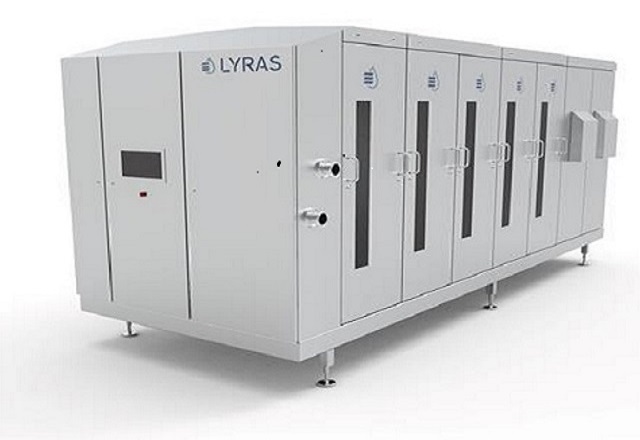As far as is known, the Raslysation Castor plant will be the world’s largest for UV treatment and inactivation of microorganisms in opaque liquids
As part of its expansion strategy, Lyras, a Danish company specialising in sustainable pasteurisation technology, has launched a new raslysation plant, which is the world’s largest for UV treatment of liquid foods. The new unit – The Raslysation Castor – can produce 380,000 L/h, which is tenfold the amount of the company’s top seller, The Raslysation Sirius. It has been developed in collaboration with Novozymes, a biotech group who are a market leader in industrial enzymes, and can be quickly adapted to the individual customer.
Raslysation effectively inactivates bacteria and other microorganisms in liquids such as whey and juice while saving 60% to 80% of water and 60% to 90% of the energy that traditional pasteurisation equipment requires. The taste and structure of the product is preserved as heating is avoided. With raslysation, a dairy with a single plant from Lyras can reduce its energy consumption, in turn cutting Co2 emissions annually by approximately 850 tons. This corresponds to 164 trips around the world in an ordinary family car.
Said Nete Zarp Nielsen, Lyras CTO: “The new modular plant is the latest and most exciting step in our company’s journey to provide the best possible service to our customers. The Raslysation Castor allows us to ensure that food producers, who produce 100 cubic meters of liquid per hour, can inactivate all microorganisms in an easy and simple way. Because of this technology we have been able to open new locations across the globe and we are set to expand further within the next 12 months.”
Global interest in Lyras and its ability to provide a water saving replacement for pasteurisation and raslysation means the company has been able to expand beyond Denmark, with branches now open in the Netherlands, France, Spain and South Africa.
Added Mark Kalhøj Andersen, CCO: “Our goal at Lyras is for the food and processing industry to have saved at least one million tonnes of Co2 using our technology by the end of the decade. This cannot be achieved by focusing on one country and that is why we have taken the decision to expand across multiple markets. However, we don’t want to stop there. We have ambitious aims and the next step for us is to break into the United States.”
In addition to saving water and energy, raslysation provides higher product yields and maintains full microbial control with lower operating costs. The raw material’s valuable proteins are preserved in their original form, as heating is omitted. The technology ensures high food quality in opaque liquids such as dairy products thanks to ultraviolet light and unique hydraulics that effectively inactivate microorganisms. When the technology is used to replace depth filtration, a higher yield and increased degree of automation in the production process is ensured. The liquid is led past a UV light source, combined with a light filter in a controlled movement, so that all parts of the product are illuminated. This inactivates all unwanted microorganisms while preserving more of the original taste as well as vitamins and proteins.
Concluded Nielsen: “As a company, our goal is to support the process industry to limit energy and water consumption and usage. Over the last few years, we have done an excellent job in doing this, but we don’t want to stand still, it’s in our blood to ensure we are constantly evolving, and this is why we invested in Raslysation Castor. By doing this, we are creating a better, more sustainable way to produce products that millions of people consume every day.” For more visit lyras.com



